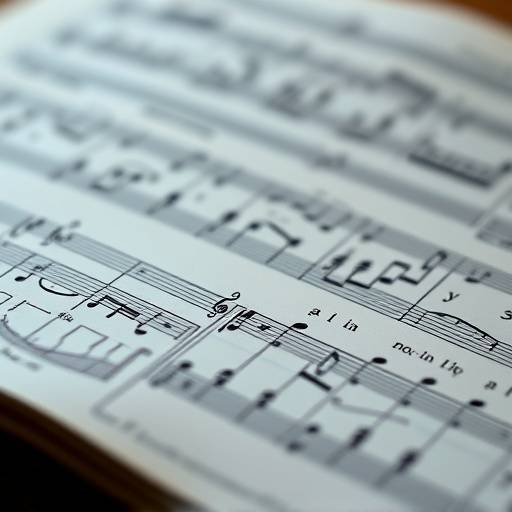Selecting and Polishing Your Audition Piece

Choosing the right piece is crucial for a successful audition. Select a piece that showcases your strengths, suits your voice or instrument, and is within your technical capabilities. Don't try to impress with something too difficult – focus on demonstrating mastery and musicality.
-
Know Your Strengths:
What are you naturally good at? Showcase those skills.
-
Consider the Style:
Choose a piece that you genuinely enjoy and connect with.
-
Technical Proficiency:
Ensure you can play or sing the piece flawlessly.
-
Meet the Requirements:
Adhere strictly to any guidelines provided by the audition committee.
Once you've chosen your piece, practice diligently. Pay attention to detail, refine your technique, and work on your interpretation. Record yourself practicing to identify areas for improvement. Seek feedback from your instructors or mentors.
"Practice doesn't make perfect. Perfect practice makes perfect." - Vince Lombardi
Mastering Essential Performance Techniques

Technical skill is only part of the equation. Engaging performance techniques can significantly enhance your audition.
-
Posture and Presence:
Maintain good posture and project confidence. Your body language communicates as much as your music.
-
Eye Contact:
Connect with the audition panel through genuine eye contact. It shows engagement and sincerity.
-
Facial Expressions:
Convey the emotion of the music through your facial expressions. Be authentic and expressive.
-
Breathing Techniques:
Proper breathing is essential for both vocalists and instrumentalists. Practice controlled breathing to maintain stamina and prevent tension.
-
Dynamic Range:
Utilize a wide dynamic range to create contrast and interest in your performance.
Remember, performance is about communication. Tell a story with your music, and let your passion shine through.
Conquering Stage Fright and Building Confidence

Stage fright is a common experience for performers of all levels. However, with the right strategies, you can manage your anxiety and perform with confidence.
Effective Strategies for Managing Anxiety:
-
Preparation is Key:
The more prepared you are, the more confident you'll feel. Practice until the piece is second nature.
-
Visualization:
Visualize yourself succeeding in the audition. Imagine yourself performing confidently and receiving positive feedback.
-
Deep Breathing Exercises:
Practice deep, slow breathing to calm your nerves. Inhale deeply through your nose, hold for a few seconds, and exhale slowly through your mouth.
-
Positive Self-Talk:
Replace negative thoughts with positive affirmations. Remind yourself of your strengths and accomplishments.
-
Physical Exercise:
Engage in physical activity to release tension and reduce anxiety. A brisk walk or a short workout can do wonders.
-
Mock Auditions:
Practice performing in front of friends, family, or colleagues. This will help you get used to performing under pressure.
Remember that nerves are normal. A little adrenaline can actually enhance your performance. The key is to manage your anxiety so that it doesn't interfere with your ability to perform.
Understanding the Audition Panel and Their Expectations

Knowing what the audition panel is looking for can give you a significant advantage. While each panel is unique, there are some common expectations.
Key Considerations:
-
Musicality:
Demonstrate a deep understanding and appreciation of the music.
-
Technical Proficiency:
Showcase your mastery of your instrument or voice.
-
Interpretation:
Offer a unique and compelling interpretation of the piece.
-
Professionalism:
Be punctual, respectful, and well-prepared.
-
Potential:
Show that you have the potential to grow and develop as a musician.
The panel wants to see your passion, your talent, and your potential. Be yourself, and let your love of music shine through.
Dress Code and Etiquette: Making a Positive First Impression
Your appearance and behavior can influence the panel's perception of you. Dress professionally and adhere to proper etiquette to make a positive first impression.
Guidelines for Dress and Demeanor:
-
Dress Appropriately:
Choose attire that is professional, comfortable, and appropriate for the setting. Avoid anything too flashy or distracting.
-
Be Punctual:
Arrive on time, or even a few minutes early.
-
Be Respectful:
Treat the audition panel and staff with respect and courtesy.
-
Be Confident:
Project confidence and maintain good posture.
-
Be Yourself:
Be genuine and authentic in your interactions.
Remember, you are not just being evaluated on your musical ability, but also on your professionalism and demeanor.
Sample Audition Dress Code Suggestions (Subject to Change)
|
Instrument
|
Appropriate Attire
|
Attire to Avoid
|
|
Vocalist
|
Dress pants or skirt, button-down shirt or blouse, comfortable dress shoes
|
Jeans, t-shirts with graphics, sneakers
|
|
Pianist
|
Suit or dress pants with a blazer, dress shirt or blouse, dress shoes
|
Casual clothing, shorts, flip-flops
|
|
String Instrument (Violin, Cello, etc.)
|
Formal dress, suit, dress pants with a formal top, dress shoes
|
Extremely revealing clothing, overly casual attire
|




